Benefits of Autism Diagnosis
Autism is a neurodevelopmental disorder that affects individuals in various ways. While the diagnosis of autism can be overwhelming for families, it is important to recognize the numerous benefits that come with obtaining an early and accurate diagnosis. In this article, we will explore the significant advantages of autism diagnosis and how it can positively impact the lives of individuals on the autism spectrum.
Understanding Autism
Before delving into the benefits of autism diagnosis, it is essential to have a clear understanding of what autism is. Autism, or Autism Spectrum Disorder (ASD), is a complex condition that affects social interaction, communication, and behavior. It is characterized by a range of challenges, including difficulties in social skills, repetitive behaviors, and sensory sensitivities.
Early Intervention and Support
One of the key advantages of early autism diagnosis is the ability to access early intervention and support services. With an early diagnosis, individuals on the autism spectrum can receive targeted therapies and interventions tailored to their specific needs. These interventions can make a significant difference in their development, helping them acquire crucial skills and improve their overall quality of life.
Educational Planning
Another benefit of autism diagnosis is the opportunity for educational planning. With a diagnosis in hand, parents and educators can collaborate to create an individualized education plan (IEP) that addresses the unique learning needs of the individual. This tailored approach ensures that the educational environment supports their strengths and helps them overcome challenges, maximizing their potential for academic success.
Access to Specialized Services
Individuals with an autism diagnosis gain access to a wide range of specialized services and resources. These services may include speech therapy, occupational therapy, behavioral therapy, and social skills training. By availing of these services, individuals can develop essential life skills, improve communication abilities, and enhance their overall social interactions.
Community Support and Acceptance
Obtaining an autism diagnosis can also lead to increased community support and acceptance. With a better understanding of autism, families and individuals can connect with support groups, advocacy organizations, and online communities. These networks provide a sense of belonging, information sharing, and emotional support, fostering a supportive environment for individuals with autism and their families.
Employment Opportunities
An autism diagnosis can open doors to employment opportunities specifically designed for individuals on the autism spectrum. Many companies and organizations are recognizing the unique strengths and abilities of individuals with autism, such as attention to detail, pattern recognition, and logical thinking. By embracing neurodiversity, these employers create inclusive workplaces where individuals with autism can thrive and contribute meaningfully.

In conclusion, the benefits of autism diagnosis are numerous and far-reaching. From early intervention and educational planning to access to specialized services and community support, an accurate diagnosis empowers individuals with autism to lead fulfilling lives. By embracing and understanding autism, society can create a more inclusive and accepting environment for everyone. the
Frequently Asked Questions about the Benefits of Autism Diagnosis
1. What are the benefits of getting an autism diagnosis?
Getting an autism diagnosis can provide a better understanding of an individual’s unique needs, leading to appropriate support and interventions.
2. How can an autism diagnosis benefit my child’s education?
An autism diagnosis can help educators develop personalized education plans, accommodations, and interventions to support your child’s learning and social development.
3. Does an autism diagnosis provide access to specialized services?
Yes, an autism diagnosis can open doors to specialized services, therapies, and support networks that can greatly benefit individuals with autism and their families.
4. Can an autism diagnosis lead to early intervention?
Yes, an early autism diagnosis allows for early intervention, which has been shown to significantly improve developmental outcomes and long-term functioning.
5. How does an autism diagnosis benefit adults?
An autism diagnosis in adulthood can provide a better understanding of oneself, leading to self-acceptance, access to appropriate support, and potential accommodations in work or social settings.
6. Does an autism diagnosis provide access to financial support?
Depending on the country and local regulations, an autism diagnosis may grant access to financial support, such as disability benefits or funding for therapies and interventions.
7. Can an autism diagnosis help in building social connections?
Yes, an autism diagnosis can help individuals and their families connect with autism-specific support groups, online communities, and social networks, fostering a sense of belonging and understanding.
8. How can an autism diagnosis benefit mental health?
An autism diagnosis can lead to appropriate mental health support, including therapies and strategies to address anxiety, depression, and other mental health challenges commonly associated with autism.
9. Does an autism diagnosis provide legal protections?
In many countries, an autism diagnosis can provide legal protection against discrimination in education, employment, and other areas of life, ensuring equal rights and opportunities.
10. Can an autism diagnosis help families access respite care?
Yes, an autism diagnosis can make families eligible for respite care services, providing temporary relief for caregivers and promoting overall family well-being.




